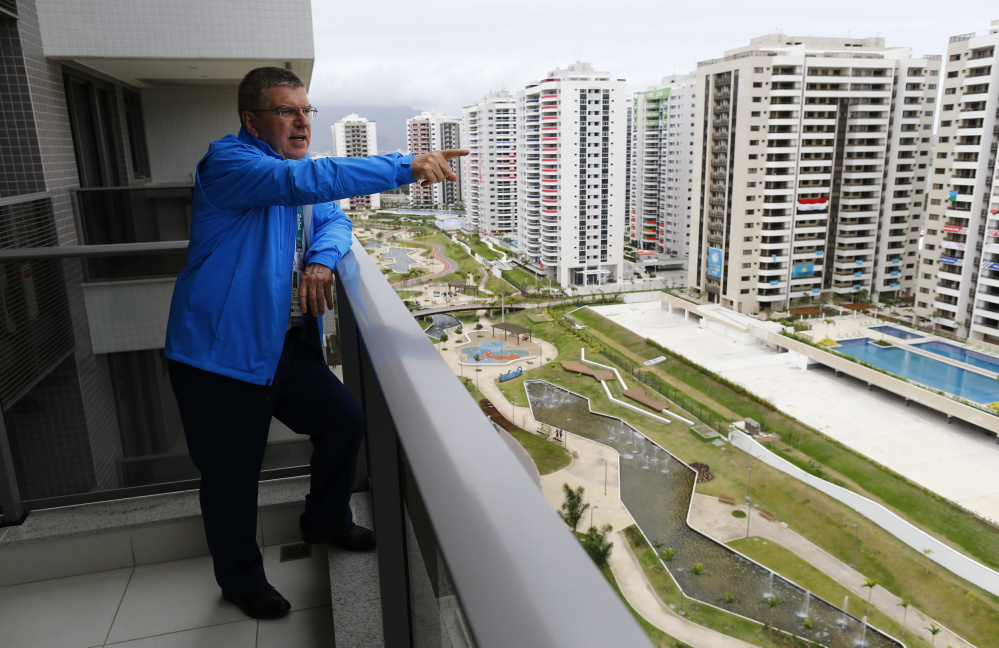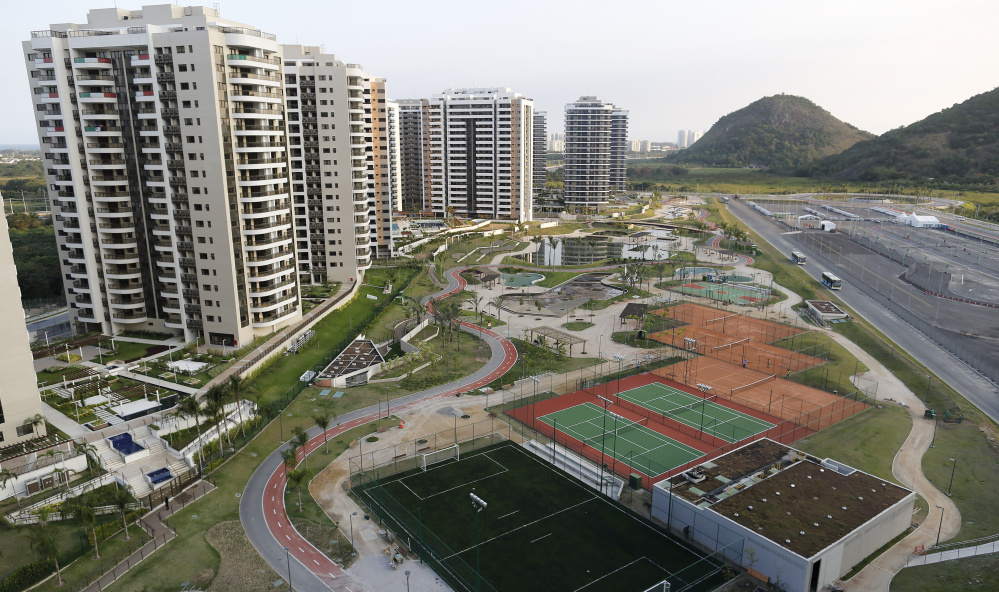It is the iconic image of Brazil, one you’ve probably seen hundreds of times and likely will hundreds more over the coming weeks as NBC presents 6,755 hours of television and digital coverage of the Summer Olympics from Rio de Janeiro.
Copacabana Beach. Waves crashing on the shore. Bikinis. Sun. Sand. Blue sky. Puffy white clouds.
It’s an alluring image and a misleading one.
What you don’t see is the drug-resistant bacteria that scientists found in the waters off Rio beaches.
You don’t see the human body parts that washed onshore not far from the beach volleyball venue.
You don’t see the street thieves who prey on beachgoers.
You don’t see political turmoil from the nation’s first female president being impeached, or the economic crisis from the worst recession since the 1930s.
Or the headlines about Rio’s drug-testing lab having its international accreditation suspended and reinstated only last week, just as the Olympic movement is grappling with the specter of state-sponsored doping by Russia.
This is the Rio that the Games of the XXXI Olympiad encounter beginning Friday. Beaches and budget cuts, samba and subways that may or may not be finished. Pride and pestilence. Carnival and corruption. Caipirinhas and carbapenem-resistant enterobacteriaceae.
Interlocking rings of mayhem.
It wasn’t quite what the International Olympic Committee envisioned in 2009 when it voted to take the Olympics to South America, when it rewarded the passionate pleas of affable Brazilian President Luiz Inácio Lula da Silva.
“Now,” the man who goes by Lula said that day, “we are going to show the world we can be a great country.”
This is the first time the winter or summer games are in South America, but not the first time they have been awash in impending calamity in the months and weeks before. (Remember Athens in 2004?) It goes like this: There are no athletic competitions to discuss so the focus turns to organizational problems, to traffic or smog or terrorism or human rights violations. Then the athletes show up, the cauldron is lit and everyone forgets about the ticket scandal or the design flaws of the cycling velodrome.
So there’s hope. Maybe the spirit of global competition, maybe the virtues of humanity, maybe the exultant ideals of Olympism can prevail again.
Maybe the athletes can bail out Rio. Because somebody has to.
THE ZIKA VIRUS
Canadian tennis star Milos Raonic, ranked No. 7 in the world, became the latest big name to play the Zika card and withdraw from the Rio Games.
British rower Phelan Hill called him out on Twitter: “Probably too scared of losing to (Andy Murray) again!”
It’s a convenient excuse, blaming a global pandemic for backing out of the Olympics and receiving anxious nods of approval. But there remains a healthy debate over how much of a health concern it actually is.
The panic over the pandemic peaked in May, when the Harvard Public Health Review published a commentary demanding that the Olympics be postponed, moved or canceled because of the virus transmitted by mosquitoes and linked to grisly birth defects. The argument is that Rio sits at an epicenter of the outbreak and, with an expected 500,000 foreign visitors, could unnecessarily accelerate its spread before scientists can develop a vaccine.
“The International Olympic Committee says, ‘Olympism seeks to create … social responsibility and respect for universal fundamental ethical principles,’ ” Canadian lawyer and professor Amir Attaran wrote. “But how socially responsible or ethical is it to spread disease? Mass migration into the heart of an outbreak is a public health no-brainer.”
The counterargument: The World Health Organization, the Centers for Disease Control and Prevention and other infectious disease experts have suggested that while still not advising pregnant women travel to Brazil, the chances of contracting Zika or unwittingly spreading it are overblown.
Still, Olympic organizers and national governing bodies aren’t taking any chances. The former have sent gas-mask-wearing teams of workers to spray for mosquitoes in and around competition venues. The latter are stocking up on repellant and designing opening ceremonies uniforms with long sleeves and pants despite temperatures that could reach into the 90s.
CRIME
Six weeks ago, Australian Paralympian Liesl Tesch was out for a morning bike ride in Rio with her physiotherapist when two men jumped in front of them. One had a pistol.
They demanded money and not finding any, took their bikes instead.
“Absolutely horrific,” Tesch, 47, who has won medals in sailing and wheelchair basketball, and was training in Rio ahead of the Paralympic Games in September, told Australian media. “My important message is to make it really clear that this is a dangerous place and you’ve got to be on your guard.”
That was on the morning of June 20. A few hours later, 15 armed men attacked a Rio hospital in hopes of freeing “Fat Family,” a local drug lord who was under police protection while being treated for gunshot wounds. A hospital patient was killed in the crossfire.
“Historically, unfortunately, that’s how Rio de Janeiro is,” José Mariano Beltrame, Brazil’s secretary of public security, said after five people were killed by stray bullets in the space of three days, including a student and an Uber driver.
According to an international crime index compiled by the website Numbeo, Rio ranks 11th on a list of the planet’s most crime-infested cities – behind three others in Brazil, four in South Africa, Caracas, Baghdad and San Salvador. Statistics for Rio released this spring by Brazil’s Public Security Institute saw murder rise 15.4 percent from last year, car theft rise 19.7 percent and street robberies rise 23.7 percent.
Athletes inside the official Olympics “bubble” – the village, venues, authorized transport – should be safe. But tourists and anyone else outside it could be exposed to one of the world’s most dangerous cities with a police force that admits it doesn’t have the resources (or motivation) to protect them.
“Welcome to Hell,” read an English-language banner displayed by police at Rio’s international airport last month after claiming their paychecks had stopped.
But there is hope. The government released emergency funds to pay police. And one theory is that the recent spike in crime is an acknowledgment by street gangs that the enormous police and military presence during the Games – 85,000 officers, by some accounts – will curb their normal activity, so they are trying to make extra money now before leaving the tourists alone in August.
WATER
Rio, in many respects, is an upside- down city, and not because it is in the southern hemisphere. The rich live on the flats; the poor live on the hillsides, with sweeping vistas of the mountains, and ocean and urban sprawl.
The problem is that the poor in Brazil are so poor that most don’t have modern waste management systems, and garbage and sewage roll down the hillsides in murky creeks that render Guanabara Bay, once a pristine habitat of birds and marine life, the world’s largest septic tank. Sailing, rowing, canoeing, kayaking, open water swimming, triathlon – about 1,000 total athletes – are all affected.
The first issue was debris, the odd floating couch slamming into a Finn class sailboat. Then foreign entities began taking water samples and testing them for bacteria; an Associated Press study found contamination levels in some areas are 1.7 million times higher than would close a beach in Europe or the United States. Then they discovered evidence of a drug-resistant “super bacteria,” allegedly from untreated waste from a hospital. One sailor was treated for a flesh-eating bacteria after training in Rio.
The latest issue: an oil slick on Guanabara Bay that stained boat hulls.
When Rio was awarded the Olympics, its bid promised to increase the treatment of sewage flowing into the bay from 20 percent to 80 percent; it got to 51 percent. Eight treatment plants were supposed to be built; one was.
Rio organizers admitted that sure, there was pollution where the creeks emptied into the bay, but events like sailing would be held in the middle of the 159-square-mile body of water, where contamination levels are better flushed out by the ocean tides.
The latest studies say they’re not.
Rowers are bleaching oars and wearing body suits with fabric coated by an antimicrobial finish. Sailors are hosing everything off immediately after docking. Swimmers are conscious of not swallowing.
“We’re talking about an extreme environment,” said Kristina Mena, a University of Texas expert in waterborne viruses who reviewed results of water samples in the Associated Press study, “where pollution is so high that exposure is imminent and the chance of infection very likely.”
What does that mean in numbers? Mena estimated a 99 percent chance of infection from ingesting as little as three teaspoons of water, although how sick you get depends on individual immunity levels.
Yet most athletes remain undaunted.
“We’ve been eight times to Rio,” said Briana Provancha, who will race in sailing’s 470 class. “I’ve spent over 150 days on Guanabara Bay. I’m still alive and kicking. The (U.S.) team has put together recommendations how to help us down there,and we fully trust that. Right now it’s not a distraction for us.
“We are going to show up and treat it like a normal event. We’ve been there a lot and we are prepared for whatever Rio throws at us.”
POLITICS/ECONOMY
When Rio was awarded the 2016 Summer Games in September 2009, life was good.
The popular Lula was approaching his final year in office but had a hand-picked successor in Dilma Rousseff, who would become the country’s first female president. The economy was humming along with oil prices approaching $100 per barrel, and experts predicting Brazil would pass the United Kingdom and France to become the world’s fifth largest. Morale was high in the soccer-mad nation geeked up to host the 2014 World Cup.
Then: Lula got throat cancer.
Then: Rousseff became entangled in corruption allegations. She has been suspended since May while impeachment proceedings are held.
Then: Oil prices plunged into the $30s while a multibillion-dollar bribery scandal rocked Petrobras, the nation’s largest petroleum company.
Then: The Brazilian real lost 50 percent of its value against the dollar.
Then: Inflation and unemployment soared into double digits.
Then: Germany beat Brazil in the World Cup semifinals by a 7-1 score that buckled the nation’s swagger.
The result is political instability and the worst recession in nearly a century, hardly the climate to host an international sporting event legendary for its cost overruns. The result has been extreme budget cuts.
Rio Mayor Eduardo Paes has put his best smile on it, telling reporters recently: “We are not a rich country. So every time I can cut some of the budget for the Olympics, we will do it. This is not going to be the Olympics of wasting money.”
Instead this will be an Olympics of, well, who knows. We’re about to find out.
Send questions/comments to the editors.




Success. Please wait for the page to reload. If the page does not reload within 5 seconds, please refresh the page.
Enter your email and password to access comments.
Hi, to comment on stories you must . This profile is in addition to your subscription and website login.
Already have a commenting profile? .
Invalid username/password.
Please check your email to confirm and complete your registration.
Only subscribers are eligible to post comments. Please subscribe or login first for digital access. Here’s why.
Use the form below to reset your password. When you've submitted your account email, we will send an email with a reset code.